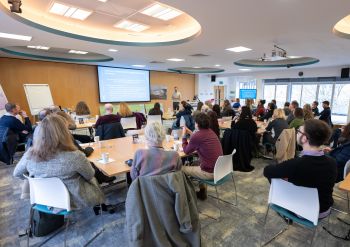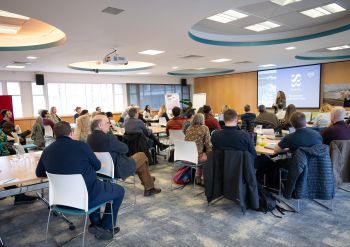Workshop focuses on research to improve our coastal region
By: Ellie Evans
Last updated: Monday, 24 February 2025


More than 60 researchers came together last month on our campus to explore how their work can enable Sussex Bay to create a healthy blue ecosystem on our doorstep.
The workshop, which took place on Monday, 21 January, in the Jubilee Building, saw academics from the University of Sussex joined by their counterparts from the University of Brighton, the University of Kent and the University of Chichester.
The aim? To look at ways to develop collaborations with external partners and learn more about decision-making in our local area.
Learning how research can power change
Sussex Bay is an innovative partnership to enable a healthy blue ecosystem in which nature, people and local economy can thrive. It spans 100 miles of Sussex waters from Chichester to Camber Sands, out to 12 nautical miles and into the intertidal zones of the Sussex river catchments, wetlands and saltmarshes.
As the research and evidence lead for Sussex Bay, in charge of producing the blueprint for seascape recovery, Lewis White is driven by “making sure that the decisions and actions we take are led by the best science, and that we put nature at the centre of it all”.
Research is an integral part of its ambitions, ensuring that transformation for the region is evidence-based and that investment in time and effort brings about change.
How Sussex is collaborating with Sussex Bay
The session heard from Professor Mika Peck, who introduced the Aquatic Research and Knowledge Exchange (ARK) group: doctoral students Alice Clark and Marianne Glascott from the Faculty of Science, Engineering and Medicine explained how the University is monitoring the return of sea kelp off the coast of Sussex.
Dr Shova Thapa Karki, from the Business School, and Dr Pauline von Hellerman, from the Faculty of Social Sciences, introduced a new project centred on the Blue Governance of Sussex Bay and the challenges and opportunities for marine and coastal recovery, which is being funded by the Marine Management Organisation.
And Aisling McGarrigle, Senior Policy Officer from the Blue Marine Foundation, spoke about the value of evidence in helping to influence policy-makers and why the work of Sussex Bay matters.
“This day allowed us to talk about the breadth of research we can use to support a thriving blue ecosystem,” says Lewis. “In addition to talks we physically mapped out where the different research in Sussex is currently happening, giving us that wider sense of scale.
“Of course, this is just the beginning and I hope that the conversations and connections we made lead to more great projects to support the future of Sussex Bay.”
To find out more and get involved, visit www.sussexbay.org.uk/contact
This work supports the UN’s Sustainable Development Goals: SDG 11 (sustainable cities and communities), SDG 13 (climate action), SDG 14 (life below water) and SDG 15 (life on land).You can read more about our work on the SDGs here.

